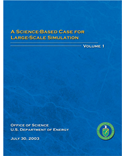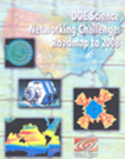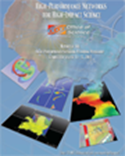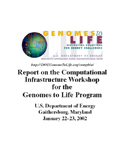ASCR Program Documents Archive
Provided below is a listing of archived ASCR-sponsored workshop reports, articles, and plans.
Additional reports from ASCR’s Federal Advisory Committee are available from the ASCAC report page.

Large Scale Computing and Storage Requirements for Basic Energy Sciences Research: Target 2017
The latest review revealed several key requirements, in addition to achieving its goal of characterizing BES computing and storage needs. High-level findings are: (1) Scientists will need access to significantly more computational and storage resources to achieve their goals and reach BES research objectives; (2) Users will need assistance from NERSC to prepare for Cori (NERSC-8) and follow-on manycore systems; (3) Research teams need to run complex jobs of many different types and scales; (4) BES is a leader in innovative use of HPC and requires a diverse set of resources and services from NERSC; and (5) BES facilities need computational analysis and data storage resources beyond what they can provide.

Accelerating Scientific Knowledge Discovery (ASKD) Working Group Report
Sustained scientific progress over the next decade and beyond will require new advanced discovery ecosystems quite different from the computational and collaborative environments in which most research is performed today. These systems will need to connect increasing numbers of scientists, enable use of data and computational services at unprecedented scales, foster scientific discoveries based on ever more complex cross-disciplinary hypotheses, facilitate the immediate sharing and exchange of existing and emerging knowledge, and provide mechanisms for timely control of and feedback to instruments and simulations. To achieve this goal requires computer science research advances in multiple areas.

Data Crosscutting Requirements Review
In April 2013, a diverse group of researchers from the U.S. Department of Energy (DOE) scientific community assembled in Germantown, Maryland to assess data requirements associated with DOE-sponsored scientific facilities and large-scale experiments.

Report on HEP/ASCR Data Summit
Representatives from the HEP and ASCR communities met at Germantown on April 2-3, 2013, to discuss issues in carrying out science with large datasets and associated data-intensive computing tasks. The authors of this report acknowledge the important contributions made by all of the ASCR and HEP participants at the data summit and thank them for their efforts.

Large Scale Computing and Storage Requirements for Fusion Energy Sciences Research: Target 2017
The latest review revealed several key requirements, in addition to achieving its goal of characterizing FES computing and storage needs. High-level findings are: (1) To meet Fusion Sciences research objectives, FES researchers need computing and data storage resources in excess of those predicted by historical trends; (2) FES codes will require updated mathematical and I/O libraries that will run efficiently on next generation architectures; (3) FES scientists need support for both ensemble runs and large-scale jobs; (4) Teams need effective tools for managing workflows, performing data analysis, and profiling and developing codes; and (5) Code teams need help porting applications to run on next-generation architectures.

Data Requirements from NERSC Requirements Reviews
Department of Energy Scientists represented by the NERSC user community have growing requirements for data storage, I/O bandwidth, networking bandwidth, and data software and services. Over the next five years, these requirements are well above what would be provided by increases that follow historical trends. This report focuses primarily on the data needs of the modeling and simulation community.

Exascale Operating Systems and Runtime Software Support Report
The Exascale Operating Systems and Runtime (OS/R) Software Technical Council was convened by the U.S. Department of Energy (DOE) Office of Science and National Nuclear Security Administration (NNSA) to develop a research agenda and plan to address the OS/R challenges associated with future extreme-scale systems. The technical council met from March 2012 through October 2012, concluding with an open workshop held October 3-4 in Washington, DC.

Large Scale Production Computing and Storage Requirements for High Energy Physics: Target 2017
The workshop revealed several key requirements, in addition to achieving its goal of characterizing HEP computing. The key findings are: (1) Researchers need access to significantly more computing and storage resources to support HEP mission goals through 2017; (2) Scientists need vastly improved data I/O rates and better facilities for performing data-intensive science; (3) Research teams need to run both large-scale simulations and massive numbers of individual jobs; and (4) NERSC must help enable and ease the transition to next-generation architectures.

Large Scale Computing and Storage Requirements for Biological and Environmental Research: Target 2017
The latest review revealed several key requirements, in addition to achieving its goal of characterizing BER computing and storage needs. High-level findings are: (1) Scientists need access to significantly more computational and storage resources to achieve their goals and reach BER research objectives. BER anticipates a need for six billion computational hours (25 times 2012 usage) and 107 PB of archival data storage (10 times 2012 usage) at NERSC in 2017; (2) Simulation and analysis codes will need to access, read, and write data at a rate far beyond that available today; (3) Support for high-throughput job workflows is needed; (4) State-of-the-art computational and storage systems are needed, but their acquisition must not interrupt ongoing research efforts; and (5) NERSC needs to support data analytics and sharing, with increased emphasis on combining experimental and simulated data.

Transforming Geant4 Workshop for the Future
The "Transforming Geant4 for the Future" workshop was held in Rockville Maryland, May 8-9, 2012, to strategize about how one could modify Geant4 to operate on the emerging, highly parallelized platforms of the future. The participants of the workshop established a path forward that will enable the Geant4 software to thrive in the emerging computing environment. The success of this program will mean not only faster simulation but also enable the architects of Geant4 to add the next level of sophistication to the physics they are modeling.

Fault Management Workshop Final Report
Held June 6, 2012 at the BWI Airport Fault ManagementMarriot hotel in Maryland. The goals of this workshop were to: (1) Describe the required HPC resilience for critical DOE mission needs; (2) Detail what HPC resilience research is already being done at the DOE national laboratories and is expected to be done by industry or other groups; (3) Determine what fault management research is a priority for DOE’s Office of Science and National Nuclear Security Administration (NNSA) over the next five years; (4) Develop a roadmap for getting the necessary research accomplished in the timeframe when it will be needed by the large computing facilities across DOE.

Report on the ASCR Modeling and Simulation of Exascale Systems and Applications
A new process of “Co-Design” is being pursued in which application and computer scientists work toward the common goal of an exascale ecosystem of systems and applications. Modeling and simulation (ModSim) is a critical part of this process.

Data and Communications in Basic Energy Sciences: Creating a Pathway for Scientific Discovery
The Department of Energy Workshop on "Data and Communications in Basic Energy Sciences: Creating a Pathway for Scientific Discovery" was held at the Bethesda Marriott in Maryland on October 24-25, 2011. The workshop brought together leading researchers from the Basic Energy Sciences (BES) facilities and Advanced Scientific Computing Research (ASCR). The workshop was co-sponsored by these two Offices to identify opportunities and needs for data analysis, ownership, storage, mining, provenance and data transfer at light sources, neutron sources, microscopy centers and other facilities.

Report on the Workshop on Extreme-Scale Solvers: Transition to Future Architectures
This report presents results from the DOE workshop on Extreme-Scale Solvers: Transition to Future Architectures held March 8-9, 2012, in Washington, D.C. The workshop brought together approximately 50 experts in the development of scalable solvers to determine research areas needed both in the near term for next-generation 100-petaop supercomputers and in the longer term for the supercomputers expected at the end of the decade. The report also describes ways to make a smooth transition from the present solvers to the extreme-scale solvers of the future.

The Magellan Report on Cloud Computing for Science
The goal of Magellan, a project funded through the U.S. Department of Energy (DOE) Office of Advanced Scientific Computing Research (ASCR), was to investigate the potential role of cloud computing in addressing the computing needs for the DOE Office of Science (SC), particularly related to serving the needs of mid- range computing and future data-intensive computing workloads. A set of research questions was formed to probe various aspects of cloud computing from performance, usability, and cost. To address these questions, a distributed testbed infrastructure was deployed at the Argonne Leadership Computing Facility (ALCF) and the National Energy Research Scientific Computing Center (NERSC). The testbed was designed to be flexible and capable enough to explore a variety of computing models and hardware design points in order to understand the impact for various scientific applications.

Scientific Collaborations for Extreme-Scale Science Workshop Report
Extreme‐scale science is not simply about facilities. It inevitably also requires the exponential acceleration of progress that can be achieved when many differing intellects attack challenges collaboratively. The Scientific Collaborations for Extreme‐Scale Science Workshop, held December 6-7, 2011 in Gaithersburg, Maryland, focused on a strategic vision of how collaboration can be enabled, and on the research and development that will turn the vision into reality.

Tools for Exascale Computing: Challenges and Strategies
This report summarizes the results of a workshop on software tools for exascale machines. The goal of the report is to highlight the challenges in providing scalable tool support on exascale class machines and to identify key research and development needs as well as opportunities to meet these challenges. In this context we define tool support very broadly as software that helps programmers to understand, optimize and fix their codes as well as software that facilitates interaction between application, run-time, and hardware. This includes tools for performance analysis, static and runtime optimization, debugging, correctness verification and program transformation.

A Multifaceted Mathematical Approach for Complex Systems: Report of the DOE Workshop on Mathematics for the Analysis, Simulation, and Optimization of Complex Systems
The DOE Office of Advanced Scientific Computing Research (ASCR) Applied Mathematics Program sponsored a Workshop on Mathematics for the Analysis, Simulation and Optimization of Complex Systems on September 13–14, 2011. The workshop had approximately 50 participants from both the national labs and academia. The specific goal of the workshop was to identify new research areas in applied mathematics that will complement and enhance the existing DOE ASCR Applied Mathematics Program efforts that are needed to address problems associated with complex systems.

Exascale and Beyond: Configuring, Reasoning, and Scaling
The push toward exascale computing and beyond is torn between contradictory and possibly incompatible goals. On the one hand, one wants a system that will be available within a short span of time, on a relatively small development budget, and with the least changes possible to the current software stack. On the other hand, one wants a system that is orders of magnitude more efficient in its energy consumption. While DOE will not control the design of most of the components of an exascale system, it can influence their design and it can have a large impact on the overall system organization – both hardware and software1. Thus, DOE Research and Development involvement can focus on these system level design issues and some degree of customization. One key area of this research is modeling. The complexity of future exascale systems and the lack of practical experience with many of the technologies that may be required at exascale may well require a more formal approach to the definition of exascale system organization, departing from the ad-hoc evolution of supercomputer architectures in the last decades.

Exascale Programming Challenges: Report of the 2011 Workshop on Exascale Programming Challenges
The workshop for programming models, languages, compilers and runtime systems for exascale machines was held in July, 2011. The goal was to identify the challenges in each of these areas, the promising approaches, and measures to assess progress. The participants in the workshop articulated the research challenges in programming support for anticipated exascale systems, including specifying what is known and what remains uncertain.

Scientific Discovery at the Exascale: Report from the DOE ASCR 2011 Workshop on Exascale Data Management, Analysis, and Visualization
The workshop goal was to identify the research and production directions that the Data Management, Analysis, and Visualization (DMAV) community must take to enable scientific discovery for HPC as it approaches the exascale.

Large Scale Computing and Storage Requirements for Advanced Scientific Computing Research
The workshop revealed several key points, in addition to achieving its goal of collecting and characterizing computing requirements. Chief among them: (1) ASCR projects will need more than one billion hours of computing time at NERSC in 2014 to meet their research goals and help enable world-class scientific discovery at Office of Science HPC facilities. Approximately one-half of these hours are self-reported requirements for visual analytics; (2) Applications will need to be able to read, write, and store 100s of terabytes of data for each simulation run. Many petabytes of long-term storage will be required to store and share data with the scientific community; (3) Access to appropriate resources and support for workflows involving many small and medium-sized runs is required; and (4) ASCR projects need access to, and robust support for, a rich set of software applications, libraries, and tools.

Large Scale Computing and Storage Requirements for Fusion Energy Sciences
The workshop revealed several key points, in addition to achieving its goal of collecting and characterizing computing requirements. Key requirements for scientists conducting research in FES include: (1) Larger allocations of computational resources at NERSC; (2) Continued support for a complex ecosystem of software libraries and tools; (3) Data storage systems that can support high-volume/high-throughput I/O; and (4) Robust, highly available computational systems with high throughput, long run times, and short queue waits.

Computational Materials Science and Chemistry: Accelerating Discovery and Innovation through Simulation-Based Engineering and Science
The workshop was held July 26-27, 2010 in Bethesda, MD to assess the potential of state-of-the-art computer simulations to accelerate understanding and discovery in materials science and chemistry, with a focus on potential impacts in energy technologies and innovation.

Large Scale Computing and Storage Requirements for Basic Energy Sciences Research
Workshop participants reached a consensus on several key findings, in addition to achieving the workshop’s goal of collecting and characterizing computing requirements. The key requirements for scientists conducting research in BES are: (1) Larger allocations of computational resources; (2) Continued support for standard application software packages; (3) Adequate job turnaround time and throughput; and (4) Guidance and support for using future computer architectures.

Scientific Grand Challenges: Cross-Cutting Technologies for Computing at the Exascale
The Cross-cutting Technologies for Computing at the Exascale workshop report from the Grand Challenges Series of workshops. The workshop took place February 2-4, 2010 in Washington, DC.

Exascale Workshop Panel Meeting Report
Workshop report from a panel of 12 scientists and engineers with experience in government, universities, national labs and industry. The panel met January 2010 in Washington, D.C. to review reports prepared to document the need for a new generation of extreme-computing capability for the DOE's missions. For more information, see the ASCR Scientific Grand Challenges web page.

Scientific Grand Challenges: Architectures and Technology for Extreme Scale Computing
The Architectures and Technology workshop report from the Grand Challenges Series of workshops. The workshop took place December 8-10, 2009 in San Diego, CA.

Large Scale Computing and Storage Requirements for High Energy Physics
The workshop revealed several key points, in addition to achieving its goal of collecting and characterizing computing requirements. The chief findings are: (1) Science teams need access to a significant increase in computational resources to meet their research goals; (2) Research teams need to be able to read, write, transfer, store online, archive, analyze, and share huge volumes of data; (3) Science teams need guidance and support to implement their codes on future architectures; and (4) Projects need predictable, rapid turnaround of their computational jobs to meet mission critical time constraints.

Scientific Grand Challenges for National Security: The Role of Computing at the Extreme Scale
The NNSA workshop report from the Grand Challenges Series of workshops. This workshop was held October 6-8, 2009 in Washington D.C.

Scientific Grand Challenges: Discovery in Basic Energy Sciences: The Role of Computing at the Extreme Scale
The BES workshop report from the Grand Challenges Series of workshops. The workshop took place August 13-15, 2009 in Washington D.C.

Scientific Grand Challenges: Opportunities in Biology at the Extreme Scale of Computing
Workshop report from the Grand Challenges Series of Workshops that took place in Chicago, IL, August 17-19, 2009.

Large Scale Computing and Storage Requirements for Biological and Environmental Research
The workshop revealed several key points, in addition to achieving its goal of collecting and characterizing computing requirements. Chief among them: scientific progress in BER-funded research is limited by current allocations of computational resources. Additionally, growth in mission-critical computing – combined with new requirements for collaborative data manipulation and analysis – will demand ever increasing computing, storage, network, visualization, reliability and service richness from NERSC.

Scientific Grand Challenges: Science Based Nuclear Energy Systems Enabled by Advanced Modeling and Simulation at the Extreme Scale
Workshop report from the Grand Challenges Series of Workshops that took place in Washington DC May 11-12, 2009.

Scientific Grand Challenges: Fusion Energy Sciences and the Role of Computing at the Extreme Scale
Fusion Energy Workshop report from the Grand Challenges Series of Workshops that took place in Washington, DC, March 18-20, 2009.

Scientific Grand Challenges: Forefront Questions in Nuclear Science and the Role of Computing at the Extreme Scale
Workshop report from the Grand Challenges Series of Workshops that took place in Washington DC, January 26-28, 2009.

Scientific Grand Challenges: Challenges for the Understanding the Quantum Universe and the Role of Computing at the Extreme Scale
Workshop report from the Grand Challenges Series of Workshops that took place at SLAC in Menlo Park, CA, December 9-11, 2008.

A Scientific Research and Development Approach to Cyber Security
A community of scientists, technical experts and executives from DOE National Labs, universities, other Federal agencies and industry collaborated to develop a science-based, systems level case for a new, transformational approach to cyber security. The report identifies and analyzes R&D opportunities from that systems-level perspective.

Scientific Grand Challenges: Challenges in Climate Change Science and the Role of Computing at the Extreme Scale
Final report from the first of the Grand Challenges Series of Workshops that took place in Washington DC November 6-7, 2008.

Mid-Range Computing in Support of Science at Office of Science Laboratories
A report containing the summary of the status of midrange computing efforts at the ten Office of Science Laboratories.

Final Report: Workshop on CS/Math Institutes and High Risk / High Payoff Technologies for Applications
The workshop focused on two aspects or tracks. One was how the Applied Mathematics and Computer Science communities could help make potential high risk/high payoff areas in their application domains a reality. Since the concept of joint math and CS institutes is a new one, the second track focused on how the community's could create, develop, and manage joint CS/Math Institutes.

Applied Mathematics at the U.S. Department of Energy: Past, Present and a view to the Future
A report by an independent panel from the Applied Mathematics research community.

Mathematics for Analysis of Petascale Data: Report on a Department of Energy Workshop
The workshop engaged mathematical scientists and applications researchers to identify the next-generation mathematical techniques needed to meet the challenges posed by petascale data.

Scientific Impacts and Opportunities for Computing
This workshop was conducted for the Office of Advanced Scientific Computing Research to identify high impact opportunities in computing for investment in research to maintain the nation's preeminence in scientific discovery and competitiveness.

Workshop Report on Advanced Networking for Distributed Petascale Science: R&D Challenges and Opportunities
The workshop brought together leading network researchers in optical transport, middleware, and high-performance protocols. Their charge was to develop a high-level roadmap for the network research and development (R&D) that will be required to support DOE's distributed Petascale science over the next decade.

Breakthroughs 2008: Report of The Panel on Recent Significant Advancements in Computational Science
A report from a distinguished panel charged with identifying recent breakthroughs in computational science and enabling technologies, supported by ASCR through the INCITE program, the SciDAC program, and/or its base program.

Visualization and Knowledge Discovery: Report from the DOE/ASCR Workshop on Visual Analysis and Data Exploration at Extreme Scale
The developed visualization and data exploration tools have served admirably with gigabyte and even terabyte datasets, but at the peta- and exascale levels, those tools will no longer suffice. Scientists and researchers met under the auspices of ASCR in Salt Lake City on June 7-8, 2007 to discuss the coming "data tsunami" and issues involved in data exploration, data understanding, and data visualization at the petascale and beyond.

Computational Research Needs in Alternative and Renewable Energy
Final report from the workshop on Computational Research Needs in Alternative and Renewable Energy held in Rockville, Maryland September 19 and 20, 2007.

Advanced Scientific Computing Research: Delivering Computing for the Frontiers of Science - Facilities Division Strategic Plan for High Performance Computing Resources
The strategic vision for High Performance Computing (HPC) resources in the Facilities Division of the Office of Advanced Scientific Computing Research (ASCR) program in the Department of Energy's Office of Science for the next 10 years.

Software Development Tools for Petascale Computing Workshop: Final Report
The findings generated at the Software Development Tools for PetaScale Computing (SDTPC) Workshop held in Washington, D.C. on August 1 and 2, 2007 are in this final report.

Report of the Cyber Security Research Needs for Open Science Workshop
These are the results of Priority Research Directions (PRDs) identified during the two-day workshop held on July 23 & 24, 2007. The workshop was jointly sponsored by the DOE Office of Science and Office of Electricity Delivery and Energy Reliability. Participation included representation from national labs, higher education and industry. Participants self-identified their interests into five break-out groups, each of which was charged with identifying PRDs.

Modeling and Simulation at the Exascale for Energy and the Environment Town Hall Meetings Report
The objective of this ten-year vision is to focus the computational science experiences gained over the past ten years on the opportunities introduced with exascale computing to revolutionize our approaches to energy, environmental sustainability and security global challenges. For more information, see the ASCR Scientific Grand Challenges web page.

Report of the Computational Subsurface Sciences Workshop
The workshop, held in Bethesda, Maryland, January 9-12, 2007 was to obtain community input on computational science research needs and opportunities in the subsurface sciences and related areas, with a focus on developing a next generation of numerical models of subsurface flow and process simulation. Collaborating DOE offices were SC, EM, FE, and RW.

Management Model for Delivering High Performance and Leadership Class Computing Systems for Scientific Discovery
The purpose of this document is to describe a model for managing the activities and tasks associated with the operation of High Performance Computing Facilities (HPCF) that enable scientific discovery as well as the delivery of next generation High Performance Production Computing (HPPC) and Leadership Class Computing (LCC) resources to the HPCF to meet established cost, schedule and performance objectives.

Mathematical Research Challenges in Optimization of Complex Systems
The goal of the workshop was to articulate opportunities for mathematical research relevant to DOE applied science and technology programs, in mathematical areas that are not already a major part of the DOE applied mathematics research portfolio.

Report on the Workshop on Simulation and Modeling for Advanced Nuclear Energy Systems
DOE's Office of Office of Advanced Scientific Computing Research (ASCR) and Nuclear Energy (NE) co-sponsored a workshop to identify the research opportunities and priorities for advancing the use of simulation and modeling in the research and development of advanced nuclear energy.

Multiscale Mathematics Initiative: A Roadmap
This was the third of three DOE sponsored workshops. It was held in Portland, Oregon September 21-23, 2004, to consider the scientific needs and mathematical challenges for multiscale simulation. This report represents the important conclusions, themes and recommendations for DOE investments from all three workshops.

Final Report: Second DOE Workshop on Multiscale Problems
The Second DOE Workshop on Multiscale Problems was held from July 20 to July 22, 2004 in Broomfield, Colorado. During these three days, over eighty researchers with expertise in a wide variety of engineering, mathematical and scientific fields gathered to discuss the current state of mathematical methods for multiscale problems, possible future directions for research, and ways in which the Department of Energy could best support such activity.

Report of the First Multiscale Mathematics Workshop: First Steps toward a Roadmap
Some of the nation's leading computational scientists gathered in Washington, D.C. May 3-5, 2004 to consider the scientific needs and mathematical challenges for multiscale simulation. The goals were to (1) identify the most compelling scientific applications facing major roadblocks due to multiscale modeling needs and (2) formulate a strategic plan for investment in multiscale mathematics research that will meet these needs.

The Office of Science Data-Management Challenge: Report from the DOE Office of Science Data-Management Workshops
The DOE Office of Science Data-Management Workshops were held March-May 2004. A number of application scientists and computer scientists at these meetings came to the conclusion that the plan as presented was dangerously light on attention to data management, given the increasingly data-intensive nature of research supported by the Office of Science. This report documents these workshops.

Reasserting U.S. Leadership in Scientific Computation
The U.S. faces a major challenge in scientific computation, the foundation of scientific discovery in the 21st Century. A clear path, however, is available for the U.S. to regain leadership in this critical field.
December 2003: Paper

A Science-Based Case for Large-Scale Simulation (SCALES)
The workshop was held in Arlington, VA, on June 24, 2003 through June 25, 2003. The workshop was a major activity in an on-going process of demonstrating the need for new ultrascale computing facilities for Office of Science missions.

DOE Science Networking Challenge: Roadmap to 2008
Report of the DOE Science Networking Workshop conducted by the Energy Sciences Network Steering Committee at the request of the Office of Advanced Scientific Computing Research of the U.S. Dept. of Energy Office of Science.

High-Performance Networks for High-Impact Science
Report of the High-Performance Network Planning Workshop.

Genomes to Life: Biological Solutions for Energy Challenges
U.S. Dept. of Energy Innovative Approaches Along Unconventional Paths. Report on the Computational Infrastructure Workshop for the Genomes to Life Program. U.S. Dept. of Energy, Gaithersburg, MD, January 22-23, 2002. Prepared by the Office of Advanced Scientific Computing Research and Office of Biological and Environmental Research.
March 2002: Report




